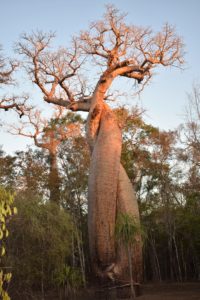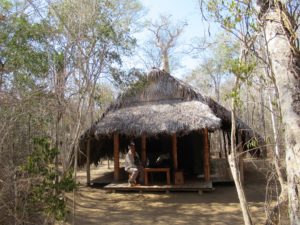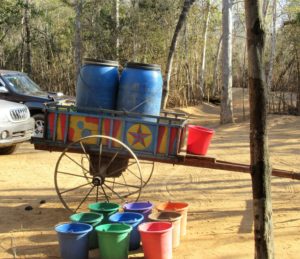After overnighting in Madagascar’s capital on arrival, “Camp Amoureux”:http://www.friendlycamp.org/en/camp-amoureux/ was our home for three nights: the camp is named after the entwined baobab tree growing in its grounds.
The accommodation was simple and basic, with 14 thatched tents well spread out in the bush and reached by sandy, tree-lined paths. Our tent, number 12, had a double and single mattress on the floor, so getting up and down wasn’t easy. The zip flap at the back, led to the bathroom, and there was another at the front, where the wooden deck had hard uncomfortable stools and table.
There was no hanging space or shelves and just one small table between the beds, so we never really unpacked. The bathroom was open air, but secluded, with a decent shower and flushing toilet with good plumbing. There was only cold water, but the weather was very hot so it didn’t matter. A sign asked us to conserve water and, having seen the process of getting water, it was understandable. A zebu pulled wagon arrived daily with two large blue plastic water butts from Marofandilia, 3.5km away. The water was transferred to multi-coloured buckets and smaller yellow drums, carried by hand, two at a time, to each tent and poured into white plastic containers (one for the shower and one for the loo). It was a two-person job with one guy up the wooden ladder pouring and the other handing up the drums.
The communal accommodation was a wooden two-storey, open-sided octagonal building, with a sand floor. The upstairs lounge had cane chairs and sofas with cushions that badly needed re-stuffing. The ground floor dining area had simple cloth covered tables and benches. One table was full of carved wooden baobab trees and other ornaments. As they were all individually, and reasonably, priced, we bought here to avoid haggling in markets and at roadside stalls.
We were on full board and meals were generous. Both lunch and dinner had a choice of 2 starters, mains and puddings and, during our three nights, we were never served the same dish. Some meals were better than others, but considering their basic kitchen facilities, it was a truly remarkable offering. Large, local Three Horses Beer was extremely good value at 5,000 Ariary Ariary or £1.12. Breakfasts were simple: cereal, juice, breads and spreads plus tea and coffee.
It was slightly disconcerting when crickets kept dropping down from the thatched ceiling and mouse lemurs poked their heads out of the posts holding up the roof.
Electricity is only available from 6am and at 10pm the generator is switched off. This was never a problem, as we were tucked up in bed by 9pm, with head torches under the pillow for night-time bathroom excursions.
This is not a luxurious place and by the end of our stay, we desperately wanted somewhere comfortable and soft to sit. However, the formidable team of smiling, friendly ladies who run the place more than made up for any discomfort.
Although, we stayed at the camp to visit the nearby Avenue of the Baobabs and Kirindy Reserve, we spotted many animals and birds both on daytime and night walks in and around the camp – including the Verreaux sifaka, Madame Berthe lemur (the smallest) and very cheeky red-fronted brown lemurs who we found playing at the back of our tent. Fortunately, we didn’t encounter the giant jumping rat.










